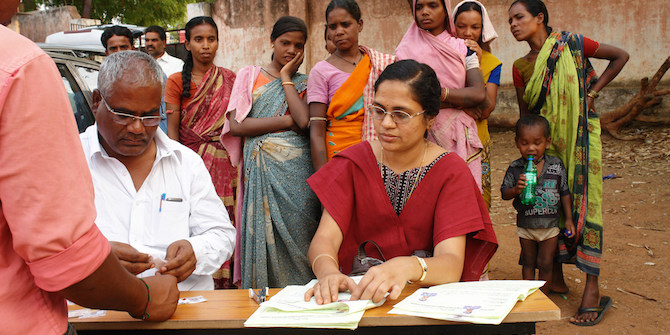Hemal Shah finds support for a truly federal Public Distribution System in India during a policy discussion at the International Growth Centre’s Growth Week 2012.
Over 300 policy-makers, researchers, and private sector representatives gathered in London from 24-26 September for the International Growth Centre’s (IGC) Growth Week 2012. The three-day programme included two public lectures, three plenaries, 10 research sessions, and 13 country sessions, one of the largest of which focused on India (Central). This dedicated session started in 2010 to look at three different aspects of growth, namely macroeconomic, urban and infrastructure, and human development issues. This year, the India (Central) session discussed three papers on the above issues, followed by a gripping policy discussion on India’s much-criticised Public Distribution System (PDS).
Commonly known as the food security system, the PDS comprises the central government’s procurement efforts and the state governments’ distribution of subsidised food grains for the poor. The goal of the system is twofold: guarantee a market for farmers and secure the right to food for the poor. Channelled through special Food Price Shops, the PDS will potentially be amplified to guarantee food for two thirds of the population through the Food Security Bill, which is scheduled for discussion in India’s parliament this autumn. However, there are several problems with this massive system, including the fact that it is riddled with corruption: shop owners are notorious for stealing and over-charging, the already malnourished beneficiaries of the system often receive poor quality food grains, ration cards are traded for money, and heavy bureaucratic procedures prevent many poor Indians from obtaining ration cards.
Beyond corruption, the PDS poses various other challenges. There are problems in determining who qualifies for this subsidy, given that India has yet to settle on a reasonable poverty line. Greater productivity has also raised questions about the system’s need and efficacy. Over time, India’s food grain stocks have increased, globally ranking next only to China. Despite having the capacity to export some of the produce, only 40 per cent of food grains reach Indian homes at the end of the supply chain. Kaushik Basu, former chief economic advisor, once exclaimed, “India is paying the price of an unexpected success — our production of rice and wheat has surged and procurement has been better than ever…This success is showing up some of the gaps in our policy.” The PDS already costs about $13 billion a year and the cost is set to increase if the bill passes this year. Furthermore, the debate on which mechanism works better – current in-kind transfers or a cash transfer alternative – remains unresolved.
Despite these problems, at Growth Week 2012, Reetika Khera, assistant professor at the Indian Institute of Technology (IIT), argued that the PDS is worth retaining. As an activist and proponent of the PDS, she acknowledged the problems of the system but presented results from her cross-sectional study showing that food coverage in India has improved over time, especially in the basket states: in 2004-05, about 75 per cent households were not covered in Chattisgarh, 78 per cent in Orissa, and 94 per cent in Jharkhand. In 2009-10, these figures dropped to 32 per cent, 46 per cent, and 73 per cent, respectively. Khera stressed that even leakage levels had fallen in that period, though there is still scope for improvement. Moreover, India as a whole saw a reduction in the poverty gap by 17.6 per cent, with Tamil Nadu as the best performer. As a keen propagator of the current system of in-kind transfers, Khera cited findings from Currie and Gahvari (2007) and showed that people were not interested in cash transfers in areas where the PDS worked.
On the other hand, Bharat Ramaswami, professor at the Planning Unit of the Indian Statistical Institute, argued mostly in favour of cash transfers. He pointed to the problem of excess procurement through PDS, which is difficult to constrain due to pressure from farm lobbies and coalition politics and is likely to be augmented with the National Food Security Bill. Ramaswami described the argument for in-kind transfers as “paternalistically weak”.
T. Nanda Kumar, member of the National Disaster Management Authority (NDMA), summed up the debate. While acknowledging the PDS to be “scandalously corrupt”, he urged policymakers to concentrate on the core concern of malnutrition and hunger. He emphasised the challenge of converging the PDS at delivery point and tackling diversion and leakage. Kumar also pointed to the problem of logistics, whereby five or six states bear the brunt of producing 60 million tons of food – 15 times the total production of the World Food Programme – for the benefit of other states. Punjab produces one-third of that total, but moving and storage can be problematic, especially since Punjab imposes high taxes on procurement. Therefore, Kumar suggested moving to cash transfers in areas where grains are abundant.
While identifying concerns about the PDS, discussants did not make suggestions for a major overhaul of the system. IIT’s Khera stressed the importance of accounting for transition costs, market variations, access to financial infrastructure, and demographic factors, while Ramaswami highlighted the need for small-scale experiments on cash transfers to better inform policy.
To conclude, NDMA’s Kumar argued for a truly federal policy, which would allow state governments fto choose the distribution mechanism that suits them best. This strategy has not only been exhorted by economists but would also consider the specific contexts of different states to determine what works and leave out what does not.
Hemal Shah is a public policy analyst at the Legatum Institute, a London-based think tank. She completed her Masters in Development Studies from LSE in 2010.







